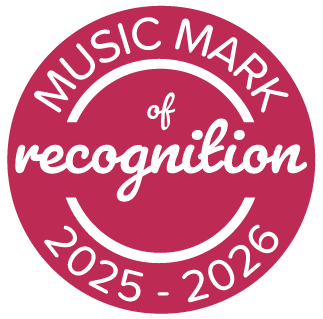

Being a Musician at Gomeldon Primary School
Intent
At Gomeldon Primary School, we are committed to a high-quality, enquiry-based music curriculum that will help pupils, in particular our most disadvantaged learners, to gain a coherent knowledge and understanding of music.
‘Music is all around us. It is the soundtrack to our lives. Music connects us through people and places in our ever-changing world. It is creative, collaborative, celebratory and challenging.’ (Model Music Curriculum 2021)
We aim to inspire curiosity, creativity and self-expression and encourage our children on their musical journeys as well as giving them opportunities to connect with others through the endeavour of whole-school singing, ensemble playing, experimenting with the creative process and, through the love of listening to friends and fellow pupils, performing. We hope to foster a life-long love of music by exposing them to diverse musical experiences and igniting a passion for music. By listening and responding to different musical styles, finding their voices as singers and performers and as composers, all will enable them to become confident, reflective musicians.
How does being a Musician link with our school values:
Reflection: Pupils will reflect on what it means to be a musician and the key knowledge and skills required to do this successfully. Pupils will perform, listen to, review and evaluate music across a range of historical periods, genres, styles and traditions, including the works of the great composers and musicians
Resourcefulness: Pupils will be encouraged to be resourceful in their approach to music. They will build, consolidate and deepen layers of knowledge.
Resilience: Pupils will develop resilience by having opportunities to learn to sing and to use their voices, to create and compose music on their own and with others, have the opportunity to learn a musical instrument, use technology appropriately and have the opportunity to progress to the next level of musical excellence
Relationships: Pupils will work collaboratively as musicians to explore key questions, sharing ideas and deciding on a suitable approach to an enquiry. Pupils will be supportive of each other and respectful as they share ideas and celebrate each other’s successes.
Through the Model Music Curriculum (March 2021) we aim to:
- at Key Stages 1 and 2, pupils should receive a minimum of one hour of teaching a week; this may take the form of short sessions spread across the week.
- In Years 3 or 4, it is recommended that each class should start a whole-class instrumental programme lasting a minimum of one term. The mandatory term will be supported by teachers from the local Music Education Hub. Opportunities for development should continue beyond the mandatory term.
- There should be access to both rhythmic and melodic instruments in Key Stages 1 and 2; this may be as part of the whole-class instrumental programme and/or in other classroom teaching.
Implementation:
Our music curriculum ensures students progress through their learning of music by singing, listening, composing and performing. This is embedded in classroom activities as well as weekly singing assemblies, various concerts, performances and shows, and the learning of instruments. The elements of music are taught in classroom lessons through the Kapow Primary Curriculum so that children are able to use the language of music to discuss it, and understand how it is made, played, appreciated and analysed.
In the classroom students learn how to play various un-tuned and tuned percussion instruments and as a class in Year 3 they learn to play a stringer instrument – usually the Violin or Viola. In doing so they understand the different principles of creating notes, as well as how to devise and read their own musical scores and basic music notation. They also learn how to compose focusing on different dimensions of music, which in turn feeds their understanding when listening, playing, or analysing music. Composing or performing using body percussion, vocal sounds and technology is also part of the curriculum, which develops the understanding of musical elements without the added complexity of an instrument.
Across key stage 2, children take part in peripatetic music lessons for Strings, Woodwind, Brass, Piano and Guitar.
Impact:
Whilst in school, children have opportunities to forge a musical journey, which allows them to discover areas of strength, as well as areas they might like to improve upon. The integral nature of music and the learner creates an enormously rich palette from which a child may access our fundamental Gomeldon values of resilience, reflection, resourcefulness and relationships as well as a sense of personal achievement and improved self-confidence.
Music will also develop an understanding of culture and history, both in relation to students individually, as well as ethnicities from across the world. Children are able to enjoy music, in as many ways as they choose - either as listener, creator or performer. They can discuss music and comprehend its parts. They can sing, feel a pulse, add rhythms and create melodies in a group and they can further develop these skills in the future and continue to enjoy and embrace music in their lives.







